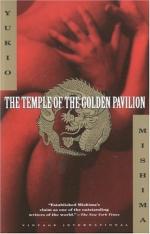|
This section contains 2,411 words (approx. 9 pages at 300 words per page) |

|
[Mishima's suicide] was rooted in what may be called his personal and aesthetic motives. No explanation, in either purely political or aesthetic terms, is adequate: the truth may be seen only from a due balance between the two. For Mishima's whole career was one of paradox built on an extraordinary tension between spirit and body, words and action and artistic creation and commitment to the world. (p. 138)
Mishima's contribution to modern Japanese literature was immense. In embracing both traditional Japanese literary sensibilities and knowledge obtained from European literature he was as masterly as Sōseki and Akutagawa. In Mishima's case, however, the mode of amalgamating the two elements was far more complex than in his predecessors. The philosophy underlying his seppuku was definitely Japanese. The last phase of his vindication of Japanese cultural identity was fanatically nationalistic. The literary past and present, or Japanese tradition and Mishima's individual...
|
This section contains 2,411 words (approx. 9 pages at 300 words per page) |

|


